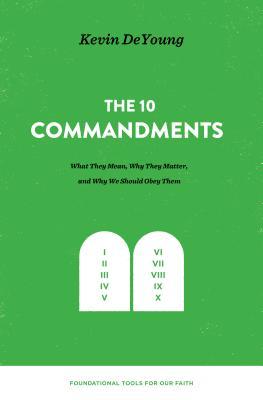What do you think?
Rate this book


208 pages, Hardcover
First published October 15, 2018
"Studying the Ten Commandments reveals the very heart of human rebellion: we don't like God telling us what we can and cannot do."When I was contemplating which book to choose from the Crossway Blog Review Program, somehow this book really appealed to me because of the title: The Ten Commandments: What They Mean, Why They Matter, and Why We Should Obey Them. Being a Christian for more than 10 years, I am very familiar with the Ten Commandments. But as Kevin DeYoung mentioned in this book, most people are ignorant of it and more people can name the seven ingredients in a Big Mac rather than recite the Ten Commandments. I am grateful that I decided to read this book because I'm definitely one of those ignorant people. I might be able to memorize most of them, but I didn't really understand the significance of it. I think this book is essential for those who are eager to perceive the Ten Commandments on a deeper level.
"As we go through these studies, we will find that the law drives us to our knees, shows us our sin, and leads us to the cross. We need forgiveness. None of us keeps these commands perfectly. At the same time however, for those who have been forgiven and know Christ, we see in both the Old and New Testament that the Ten Commandments are foundational for living an obedient life pleasing to God."
"We need to hear it again: salvation is not the reward for obedience; salvation is the reason for obedience."Another thing that I absolutely love about this book is the fact that each of the chapter titles represents each commandments in a unique way that's easier to memorize—at least for me. For example, the third commandment is titled "What's in a Name?", the fourth commandment is "Rest, Rejoice, Repeat", the sixth commandment is called "Murder, We Wrote", and so on. Needless to say, I love every single chapter in this book. I love every single part of it, actually. But in this review I'm going to share some of the chapters in which I learn the most from.
"Perhaps 'transposed' is even a better word than 'transformed.' When a piece of music is transposed, the melody stays the same, but it's played in a different octave or a different key. That's sort of how the Ten Commandments change from the Old Testament to the new. It's the same score, different key."The second commandment that I'd like to share is the one about murder; the chapter is titled Murder, We Wrote . The commandment itself is pretty explanatory, but what I like about this chapter is because Kevin DeYoung discussed several common issues that are relevant to our culture, including: suicide, abortion, and euthanasia. He clearly states that the sixth commandment prohibits us from doing those things because it is practically murder. I think this will be a really helpful chapter for people who have been unsure about these particular issues.
"How do we begin to make progress in obeying the Ten Commandments? By turning to Christ, trusting that this Immanuel is the way, the truth, and the life; that he tells us the truth, so we listen to him and believe him; and that he is the only way to be forgiven, so that when we fall short of these commandments (and we will), we can run to him for mercy."I'm really glad I decided to read this book because I learned so much from it. I really enjoyed Kevin DeYoung's writing because it's very relatable, practical, yet also Bible-centered and full of references from Scriptures. I love how in each chapter, the writer guides us and gives us examples on how to apply these commandments in our daily lives. I definitely want to revisit this book in the future because I think I need to be reminded about these things more than just once. If you're like me and have been a bit unfamiliar with the Ten Commandments or find it difficult to understand, I really suggest you to pick this book up. It might change your life just like it has changed mine 😊.
"What do you love? What are you chasing? What do you think about in the shower, on your way to work, on the drive, or folding laundry? What is the one thing you think you need in order to be really, truly happy? If the answer is anything other than God, you're an idolater."